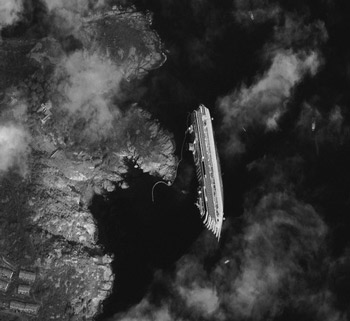Charters and Chartering
by Nicholas Walsh, PA

The cruise ship Costa Concordia ran aground on the night of January 13, 2012 off the Tuscan coast of Italy. It pitched over on its side leaving 32 dead and 64 injured. The white line in the water is likely a device used to help contain spilled oil and fuel. NASA photo
A charter, of course, is an agreement whereby in exchange for payment a ship’s owner agrees to allow another person to use his or her ship. But first some terminology.
The two parties to a charter are the owner and the charterer. The charter agreement is often called the “charter party.” “Hire” or “charter hire” is the fee paid for the charter.
There are two fundamental types of charters: bareboat (sometimes called “demise”), and time or voyage charters. In a bareboat charter, the charterer takes the boat without crew and operates the boat himself. The owner may and usually does impose some restrictions on the operation and use, including geographic limits, insurance requirements, crewing standards, sometimes even requiring approval of the master. This can get tricky, because if the owner assumes too much control over a ship that is under bareboat charter, certain valuable protections can be lost, about which more below. Bareboat charters are widely used in the Caribbean and other vacation areas for yachts, and are sometimes used in New England for commercial fishing boats.
In a time or voyage charter, the owner continues to provide crew who operate the ship as the charterer directs, for either a voyage or for a set time period. These charters are very common in the world of blue water shipping.
From time to time charter agreements end up in court. Suppose a sailor is injured on board. The boat is under bareboat charter. In a true bareboat charter the owner demises – “sells” – the ship to the charterer for a set period of time, and if the agreement is properly written the owner may be relieved of all personal liability for what happens on the ship during the term of the charter. If the charter is bareboat, the injured sailor can sue the ship and he can sue the charterer, but he can’t sue the owner. (Whether or not the ship is chartered has no bearing on whether the ship itself, as opposed to the owner, has liability to the injured sailor.) However, suppose that in our case the owner retained a great amount of control over the ship, including approving who would command the ship, and retaining the right to fire the skipper. If, because the owner retained such great control, the charter was not a true bareboat charter, the owner could be successfully sued. Such fact patterns can lead to expensive days in a courtroom and are one reason, really and truly, why an owner contemplating a charter should talk to a lawyer who does this stuff.
In the past, and to some extent today, fishing boat owners have attempted to avoid personal liability for crew injuries by chartering the boat to the master, generally for a percentage of the gross revenues. While they can serve their purpose, these arrangements are not favored and had better be very tightly written and executed. In one case, even where the charterer-master retained the right to hire his own crew, because the owner could fire the master, and continued to maintain the ship, the court found that no valid charter existed and allowed the owner to be sued personally for a shipboard injury.
If you own a fishing boat, please don’t charter to an alien who would not under U.S. law be permitted to own a U.S. fishing boat. It is illegal and can lead to seizure and loss of the boat and other horrible things.
For goodness sakes if you will charter or if you are the charterer make sure your insurance company knows in advance and that you have discussed coverages in detail and confirmed in writing.
Sometimes an owner wishes to sell a ship but the buyer doesn’t have ready cash. The owner may charter the boat to the buyer, who acquires the title only he when has paid charter hire equal to the sales price. Such an arrangement may be deemed not a true charter, but rather a sale with the seller retaining a security interest in the boat, similar to a mortgage.
There are a great many considerations that go into a well written charter party. These include port of delivery and redelivery, allowable uses, warranty of seaworthiness or the disclaimer of that warranty, surveys pre- and post-charter, allocation of expenses including repairs that may be deemed capital expenses, insurances of several kinds, default and abandonment, force majeure (acts of god) which may prevent performance by one party or the other, limitations on damages and similar exculpation clauses, events of default and what remedies exist for default, choice of law and choice of court forum, integration clauses so it is clear that no agreement not set forth in the written contract is valid, and many, many others. Some of these clauses are the so-called ‘boilerplate” so disparaged by many laypersons, and any one of which will save your bacon if the charter goes south.
Nicholas Walsh is a Portland maritime attorney with 26 years’ experience. He may be reached at (207) 772-2191, or nwalsh@gwi.net.
